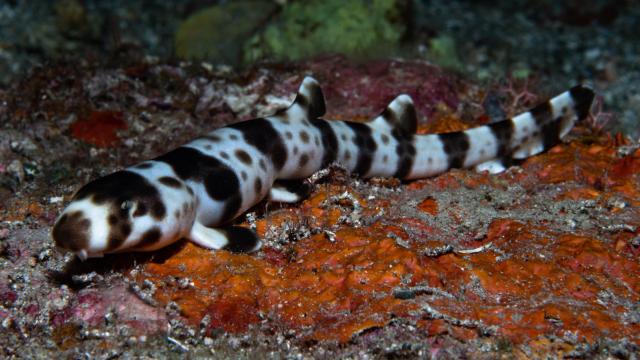Sharks have been around for a long time, emerging over 400 million years ago. New research shows that tropical ‘walking sharks’ appeared just 9 million years ago, making them the most recently evolved shark on the planet.
New research published in Marine and Freshwater Research describes nine species of walking shark, all of whom live in the waters off northern Australia, eastern Indonesia, and near the island of New Guinea. Walking sharks have been documented before, but the new research—a collaboration between the University of Queensland, Conservation International, and several other institutions—describes them an evolutionary context, including how they came to be a distinct genus.
Walking sharks may sound like a threat to unsuspecting beachgoers, but they’re harmless to humans. These medium-sized fish are known to walk on land, but they’re really at home on the seafloor, where they use their fins to walk in a distinctly quadrupedal manner. Equipped with their ornate camouflage, the walking sharks stalk small fish and invertebrates.
“At less than a metre long on average, walking sharks present no threat to people but their ability to withstand low oxygen environments and walk on their fins gives them a remarkable edge over their prey of small crustaceans and molluscs,” said Christine Dudgeon, a co-author of the paper and a marine biologist at the University of Queensland, in a press release. “These unique features are not shared with their closest relatives the bamboo sharks or more distant relatives in the carpet shark order including wobbegongs and whale sharks.”
In total, nine species of walking shark were analysed in the new paper, all belonging to the genus Hemiscyllium. Each species are “similar in body size and morphology, but can be readily differentiated based on colour patterns,” the authors wrote in the study, and all species “share a unique form of locomotion,” in which they use their “highly muscular paired fins” to rove along the seafloor while foraging for food.
Importantly, the new research suggests walking sharks speciated relatively recently, and that sharks in general are more predisposed to evolution than commonly believed.
“We found the sharks, which use their fins to ‘walk’ around shallow reefs, only split off evolutionarily from their nearest common ancestor about 9 million years ago, and have been actively [spreading] into a complex of at least nine walking sharks ever since,” Mark Erdmann, a co-author of the paper from Conservation International, said in a press release.
“That may seem like a long time ago, but sharks have ruled the oceans for more than 400 million years. This discovery proves that modern sharks have remarkable evolutionary staying power and the ability to adapt to environmental changes.”
As is often the case in evolution, the environment played a critical role in shaping this genus. The study cited factors like changing sea levels, emerging landforms, the appearance of reefs, and the dissemination of sharks to new locations as important drivers in their evolutionary development. An analysis of their mitochondrial DNA shows that Hemiscyllium emerged after a group of sharks migrated away from their ancestral population and then became genetically distinct over time after adapting to their new tropical habitats.
Walking sharks are known to exist in a limited area that includes northern Australia, New Guinea, and a smattering of islands in eastern Indonesia. Today, this limited range make them susceptible to threats such as overfishing and the ongoing deterioration of their habitats.
Of the nine walking shark species now known, three have already been added to the International Union for Conservation of Nature Red List, which lists species at risk. Other sharks in this genus could very well be added to this list soon. The authors say sensible conservation management plans are needed to protect these aquatic animals.
“A global recognition of the need to protect walking sharks will help ensure they thrive providing benefits for marine ecosystems and to local communities through the sharks’ value as tourism assets,” said Erdmann. “It’s essential that local communities, governments, and the international public continue working to establish marine protected areas to help ensure our ocean’s biodiversity continues to flourish.”
Walking sharks may be the most recently evolved shark on the planet, but that’s no guarantee of their ongoing survival. Let’s hope that conservation efforts actually work to preserve these fascinating creatures.
